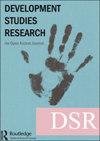大学知识转移非正式机制对企业创新绩效的影响:加纳实证分析
Q2 Social Sciences
引用次数: 0
摘要
摘要本研究旨在调查企业层面的创新,探讨知识网络中的社会关系是否会影响大学知识向加纳企业的转移。发展中经济体对企业与大学的非正式关系研究不足。现有文献表明,在具有先进的区域和国家创新体系的经济体背景下,非正式关系与企业层面的创新绩效呈正相关。该研究项目采用了对加纳245家公司的横断面调查。该项目的目的是探索加纳大学知识转移的非正式机制对企业层面创新绩效的影响。本研究采用偏最小二乘结构模型作为分析技术。研究结果表明,要通过非正式方式在企业的创新绩效中取得积极成果,需要一个协调良好的社会系统来吸引大学系统各方面的研究知识。该研究项目对加纳创新体系的影响包括需要意识到腐败和缺乏知识产权对非正式知识转移效率的影响。本文章由计算机程序翻译,如有差异,请以英文原文为准。
The influence of informal mechanisms of university knowledge transfer on firm level innovation performance: an empirical analysis in Ghana
ABSTRACT This study seeks to investigate firm-level innovation, exploring whether social relationships located in knowledge networks influence the transfer of university knowledge to Ghanaian firms. Firms’ informal relationships with universities have been under-researched in developing economies. The extant literature suggests that informal relationships in the context of economies with advanced regional and national innovation systems have a positive association with firm level innovation performance. The research project employs a cross-sectional survey of 245 firms in Ghana. The aim of the project is to explore the influence of informal mechanisms of university knowledge transfer on firm level innovation performance in Ghana. The study adopts a structural model with partial least squares as an analytical technique. The findings reveal that to deliver positive results in a firm’s innovation performance by informal means, a well-coordinated social system to attract research knowledge from all aspects of the university system is required. The research project’s implications for Ghana’s innovation system include a need to be aware of the impact of corruption and lack of intellectual property rights on the efficacy informal knowledge transfer.
求助全文
通过发布文献求助,成功后即可免费获取论文全文。
去求助
来源期刊

Development Studies Research
Social Sciences-Development
CiteScore
3.20
自引率
0.00%
发文量
20
审稿时长
12 weeks
期刊介绍:
Development Studies Research ( DSR) is a Routledge journal dedicated to furthering debates in development studies. The journal provides a valuable platform for academics and practitioners to present their research on development issues to as broad an audience as possible. All DSR papers are published Open Access. This ensures that anyone, anywhere can engage with the valuable work being carried out by the myriad of academics and practitioners engaged in development research. The readership of DSR demonstrates that our goal of reaching as broad an audience as possible is being achieved. Papers are accessed by over 140 countries, some reaching over 9,000 downloads. The importance of the journal to impact is thus critical and the significance of OA to development researchers, exponential. Since its 2014 launch, the journal has examined numerous development issues from across the globe, including indigenous struggles, aid effectiveness, small-scale farming for poverty reduction, sustainable entrepreneurship, agricultural development, climate risk and the ‘resource curse’. Every paper published in DSR is an emblem of scientific rigour, having been reviewed first by members of an esteemed Editorial Board, and then by expert academics in a rigorous review process. Every paper, from the one examining a post-Millennium Development Goals environment by one of its architects (see Vandermortele 2014), to ones using established academic theory to understand development-imposed change (see Heeks and Stanforth 2015), and the more policy-oriented papers that contribute valuable recommendations to policy-makers and practitioners (see DSR Editor’s Choice: Policy), reaches a multidisciplinary audience.
 求助内容:
求助内容: 应助结果提醒方式:
应助结果提醒方式:


